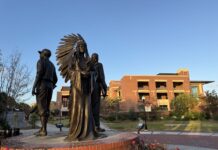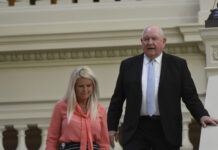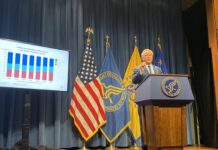
Transportation Secretary Pete Buttigieg visited Atlanta Friday to highlight President Joe Biden’s sweeping infrastructure plan even as the president agreed to scale back his ambition.
Biden unveiled a $1.7 trillion counteroffer Friday afternoon as he tries to win over Republicans who have scoffed at the level of spending and reach of the proposal. That is a drop of about a half-trillion dollars in proposed spending.
“We started very far apart, and the essence of negotiation is to see if we can come together through adjustments both to the size and scope of the president’s vision,” Buttigieg told reporters in the Atlanta BeltLine’s downtown office.
Buttigieg, who said he participated in Friday’s talks remotely during his visit, said he hoped the revision would broaden the plan’s appeal. Already, though, some GOP leaders have signaled they are less than impressed with the revamped proposal, according to the Associated Press.
“What I know is that every one of the people I’m talking to, from both parties is, from somewhere, is from a community like where we are today that is very much in need of major investments,” Buttigieg said. “Not just the investments that would allow America to stay in 13th place, but actually position us to win the future. And that’s why you see such ambition and such scale in the president’s plan, but I’ll also mention that the president’s plan is utterly affordable.”
Biden has proposed paying for the plan with a tax hike on corporations. “We think the president’s vision of asking corporations to pay their fair share is a pretty good way to get this done,” he said.
Buttigieg stood with leading Georgia Democrats in downtown Atlanta as he made the case for the president’s ambitious infrastructure plan, which also seeks to repair communities, like the nearby Sweet Auburn neighborhood, that were sliced up long ago by interstate highways.
“I think it bears mention that the civil rights movement of the last century literally began on a bus,” said U.S. Sen. Raphael Warnock. “This next move towards equity and inclusion and what Dr. King called beloved community is connected again to buses and trains and trailways, paths that allow us to connect communities that have literally been divided in the last century by infrastructure. Here, we have an opportunity to bring people together.”
U.S. Sen. Jon Ossoff called the proposal “a generational opportunity” to invest in American infrastructure.
“We can leave a mark that will last for a century,” Ossoff said.
Buttigieg started the day at Hartsfield-Jackson Atlanta International Airport, where he was lowed by a crane into a muddy pit where the plane train’s extended tunnel is under construction as part of a $6 billion expansion and modernization project.
From there, he hopped on a MARTA train and took a quick ride to the East Point station, where he met up with local officials for a walking tour of the small metro Atlanta city’s transit-oriented development. That included a small soccer field, part of MARTA’s StationSoccer program, next to a pizza shop, and the site of a mixed-use development in the works near the station that includes affordable housing.
Congresswoman Nikema Williams, an Atlanta Democrat who represents the areas where Buttigieg visited, said after the walking tour in East Point said the secretary’s swing through Atlanta helps highlight the needs on the ground.
“Everyone who lives in Atlanta understands the gridlock in traffic, so how do we make sure that our transit system gets people to good-paying jobs, to affordable, desirable housing and connect communities,” Williams said.
Buttigieg touted plans during the day to double federal transit spending, which he said was an essential supplement to the investment local communities are making through sales taxes. Those were soothing words to Jeffrey Parker, who is the CEO of MARTA.
“What I know is that the money that the City of Atlanta, Clayton County, and others have put together through referendums to fund public transportation have got to be matched against federal investments to expand our system,” Parker said Friday.







